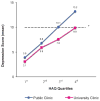Socioeconomic determinants of disability and depression in patients with rheumatoid arthritis
- PMID: 20824800
- PMCID: PMC3716282
- DOI: 10.1002/acr.20345
Socioeconomic determinants of disability and depression in patients with rheumatoid arthritis
Abstract
Objective: To examine the relationship between functional limitation, socioeconomic inequality, and depression in a diverse cohort of patients with rheumatoid arthritis (RA).
Methods: The study design was cross-sectional and subjects were from the University of California, San Francisco RA Cohort. Patients were enrolled from 2 rheumatology clinics, an urban county public hospital and a university tertiary care medical center. Age, sex, race/ethnicity, disease activity, functional limitation, and medications were variables collected at clinical visits. The patient's clinic site was used as a proxy for his or her socioeconomic status. The outcome variable was depressive symptom severity measured by the Patient Health Questionnaire 9. Differences in characteristics between depressed and nondepressed patients were calculated using 2-sided t-tests or the Pearson's chi-square test. For the multivariate analysis, repeated measures with generalized estimating equations were used.
Results: There were statistically significant differences between depressed and nondepressed patients related to race/ethnicity, public versus tertiary care hospital rheumatology clinic, disability, and medications. In the multivariate analysis, increased functional limitation and public clinic site remained significantly associated with increased depression scores. A significant interaction existed between clinic site and disability. Mean depression scores rose more precipitously as functional limitation increased at the public hospital rheumatology clinic.
Conclusion: There are disparities in both physical and mental health among individuals with low socioeconomic status. The psychological effects of disability vary in patients with RA such that a vulnerable population with functional limitations is at higher risk of developing depressive symptoms.
Copyright © 2011 by the American College of Rheumatology.
Figures
References
-
- Helmick CG, Felson DT, Lawrence RC, Gabriel S, Hirsch R, Kwoh CK, et al. for the National Arthritis Data Workgroup. Estimates of the prevalence of arthritis and other rheumatic conditions in the United States: part I. Arthritis Rheum. 2008;58:15–25. - PubMed
-
- Lawrence RC, Helmick CG, Arnett FC, Deyo RA, Felson DT, Giannini EH, et al. Estimates of the prevalence of arthritis and selected musculoskeletal disorders in the United States. Arthritis Rheum. 1998;41:778–99. - PubMed
-
- Yelin E, Meenan R, Nevitt M, Epstein W. Work disability in rheumatoid arthritis: effects of disease, social, and work factors. Ann Intern Med. 1980;93:551–6. - PubMed
-
- Hider SL, Tanveer W, Brownfield A, Mattey DL, Packham JC. Depression in RA patients treated with anti-TNF is common and under-recognized in the rheumatology clinic. Rheumatology (Oxford) 2009;48:1152–4. - PubMed
-
- Nakajima A, Kamitsuji S, Saito A, Tanaka E, Nishimura K, Horikawa N, et al. Disability and patient’s appraisal of general health contribute to depressed mood in rheumatoid arthritis in a large clinical study in Japan. Mod Rheumatol. 2006;16:151–7. - PubMed
Publication types
MeSH terms
Grants and funding
LinkOut - more resources
Full Text Sources
Medical


